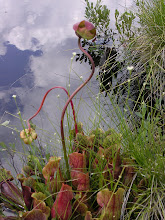Title: Vegetation Diversity, Carbon Sequestration, and Anthropogenic Disturbance as Metrics for Assessing Wetland Condition
Author(s): Andrew H. Baldwin(1), Dennis F. Whigham(2)Affiliation(s): (1) University of Maryland, College Park, MD 20742 (2) Smithsonian Environmental
Research Center, Edgewater, MD 21037
Vegetation responds rapidly to changes in management, physical disturbance, and environmental conditions, making it a useful parameter for detecting differences in condition between wetlands that have experienced different degrees of alteration. Furthermore, vegetation composition, structure, and productivity are integral to many other wetland functions, including biodiversity maintenance, nutrient processing, hydrology, sediment trapping, carbon cycling, and fish and wildlife habitat and population support. As part of a multi-investigator project to assess the effectiveness of USDA-NRCS conservation measures (CEAP), this study examines two important wetland ecosystem functions, specifically 1) Support of native plant communities; and 2) Regulating greenhouse gas emissions, specifically carbon sequestration by vegetation. Forty-eight isolated depressional wetlands in Maryland, Delaware, Virginia, and North Carolina have been selected for study. Sites are evenly divided between natural, prior converted (farmed), and restored wetlands. Each site will be visited during the peak of the 2011 growing season and sampled for species richness and evenness using randomly select 10x10-m modules spanning elevation/hydroperiod zones. Data will be analyzed using the FAQwet Floristic Assessment Quotient for Wetlands and Anthropogenic Activity Index developed by Ervin et al. in 2006. In order to quantify the carbon sequestration by the vegetation at each site, above ground biomass of herbaceous vegetation will be sampled in 1x1-m plots and the basal area of woody vegetation will be calculated. Results from this research will be used to assess wetland conservation and management measures in the mid-Atlantic region and support national models designed to influence management of wetlands in agricultural landscapes.
